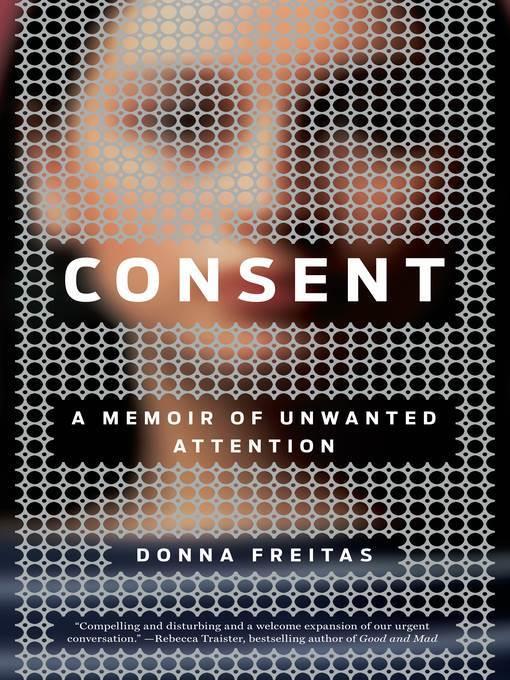
Consent
A Memoir of Unwanted Attention
کتاب های مرتبط
- اطلاعات
- نقد و بررسی
- دیدگاه کاربران
نقد و بررسی

Starred review from May 1, 2019
Hundreds of letters. Daily phone calls. Uninvited visits. Persistent invitations for coffee, meals, outings, and trips. As a graduate student, Freitas (Sex and the Soul) was a confident student who loved learning and aimed to become a professor herself, until she was stalked by her mentor, a professor who was also an ordained priest. Hesitant to confront him because of his institutional position and her own self-doubt, the author eventually found that avoidance, refusals, and even ultimatums had no effect--and when she turned to the university for help, the administration chose to shield him rather than protect her. While some may wish for a more victorious ending to Freitas's experience, the memoir itself--coming after years of silence on its author's part--is a triumph on its own. It is particularly valuable for its intimate portrait of the emotional and psychological damage nonviolent stalking can wreak on a victim and its exploration of the mental and societal pressures that keep such victims from speaking out. VERDICT Any reader interested in current discussions on consent and its importance should pick up this heartfelt and harrowing book.--Kathleen McCallister, William & Mary Libs., Williamsburg, VA
Copyright 2019 Library Journal, LLC Used with permission.

May 20, 2019
Scholar Freitas (Consent on Campus: A Manifesto) delivers a probing and painful account of being stalked by her graduate school mentor and the professional and emotional consequences it has had in the intervening 20 years. Because her mentor was a priest, an older professor, and an important figure in her field, Freitas couldn’t avoid Father L.’s “sustained unwanted attention,” even when he called daily, sent stacks of mail to her home and work, and creepily ingratiated himself with her ill mother. She lays bare in vivid scenes and complex reflections the overriding shame, confusion, and fear she felt as a productive professional relationship turned personal, then to persecution. Freitas’s narrative illustrates how self-doubt, denial, and self-blame can silence victims—she suffered for over a year before finally asking for help at her university (only to be paid off as a “nuisance” when she filed a formal complaint)—and affect them long-term (she continues to blame herself even in these pages, writing, “I did want the attention from my professor that I got in the beginning.... That was my crime.... I will blame myself forever for these initial, intimate offerings that I brought to him”). Freitas’s delicate study of her torment and its devastating effects, which raises thorny, meaningful questions about how to define consent, is an important testament for the #MeToo era. Agent: Miriam Altshuler, DeFiore and Company.

June 1, 2019
The acclaimed writer and campus lecturer shares a secret, revealing a story of stalking lurking just beneath her success. In her latest, Freitas (Consent on Campus: A Manifesto, 2018, etc.) exposes the psychological havoc caused by her stalker and navigates the complex terrain of structural sexism and double standards involved with trusting in authority, academia, and the Catholic church. Silenced first by self-doubt and later by confidentiality agreements, the author provides a harrowing narrative of the detachment and disconnection often felt by harassment survivors. In her painstaking account, imbued throughout with alternating senses of self-awareness and -doubt, Freitas reviews her choices as if constantly scanning for fault or responsibility even as she unfolds the layers of lies that protected an influential professor. Her smooth storytelling skills translate this nightmare to the page with emotionally wrought insights. "If I named this thing it would stick to me, sink into me, become me," she writes. "Not only would it rot me from the inside but now the rot would be visible. It would cling to me, mark me, become my scarlet letter." Whether caught in a monster's trap or the victim of a foolish old man's misguided and inappropriate affections, Freitas manages to refrain from judgment without shielding her discomfort with either option. She discusses life after a trauma as a victim and survivor while delivering an unforgettable analysis of a devastating ordeal. As she interrogates womanhood, professional success, and expectations about protection when such behavior is reported, the author's attention to the institutional response in light of current trends makes this an urgently vital perspective. Her excavations of victim-blaming and institution-protection actions are stark, and her sharing of this long-silenced story adds to the current social reckoning with unequal power dynamics on college campuses and elsewhere. A groundbreaking resource for educators, administrators, students, and survivors, the book explores an issue many would prefer to ignore. A potent memoir of stalking with special resonance in the era of #MeToo.
COPYRIGHT(2019) Kirkus Reviews, ALL RIGHTS RESERVED.

July 1, 2019
In her work as a writer and lecturer, Freitas often explores the world of campus sexual politics, including harassment, assault, and consent, but not her own experience of being stalked. Here, she shares how she's inhabited two different worlds?one where she's successful and strong, another where she feels terrified and alone?for years, and shows how debilitating and shameful the experience can be for a survivor of stalking. In graduate school, Freitas studied religion and philosophy, and found a challenging mentor in her professor Father L. When his attention turned from encouraging to obsessive, she couldn't believe what was happening. She had believed him, a priest and a man old enough to be her grandfather, to be safe, and continuously doubted both her misgivings and his intentions. Freitas is incredibly honest and doesn't shy away from her feelings that she is in some way at fault. She rounds out her memories with details of her family and friends as well as more studious synthesis, and calls for campus reform, adding heft to an already important story.(Reprinted with permission of Booklist, copyright 2019, American Library Association.)

























دیدگاه کاربران